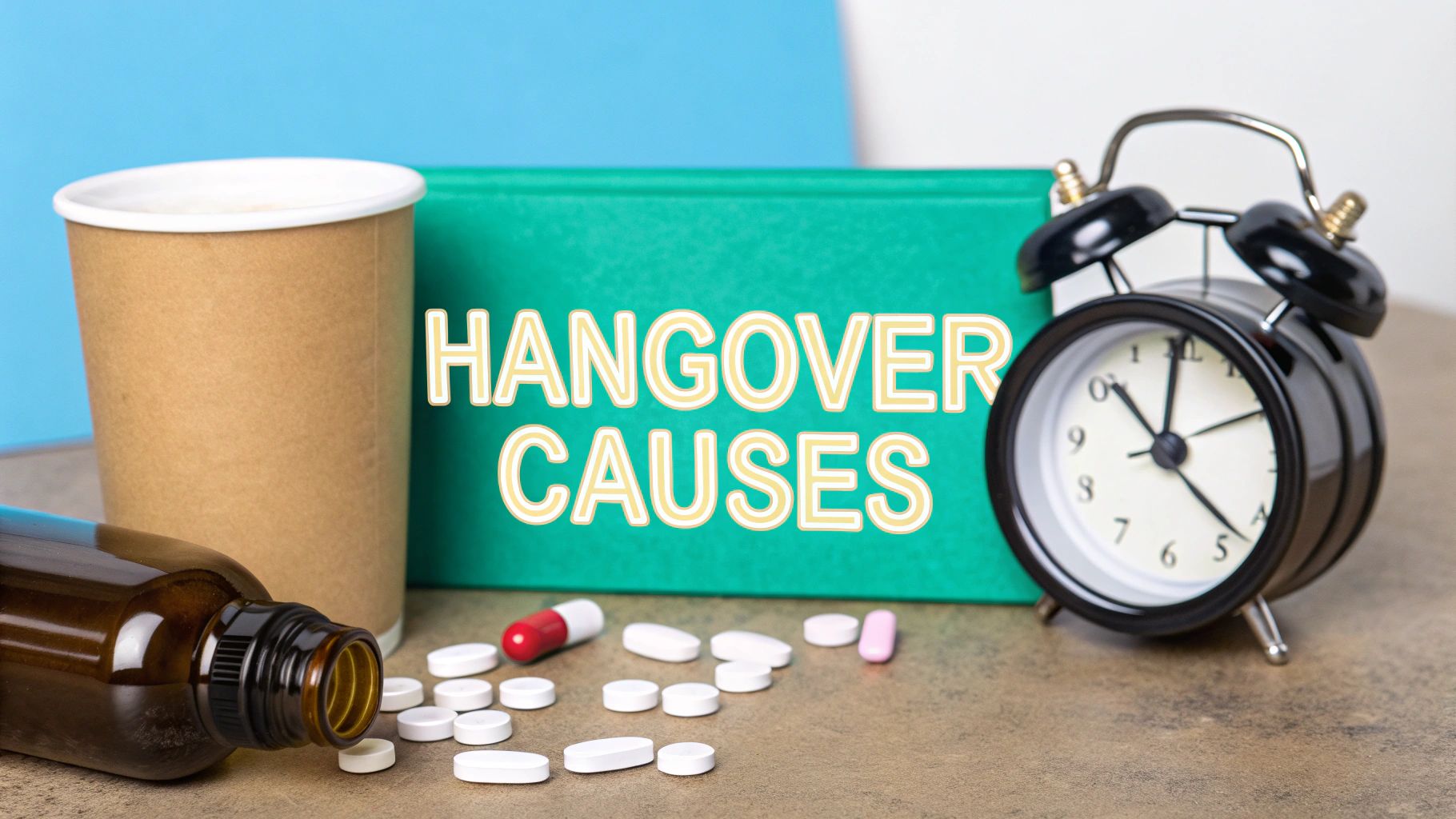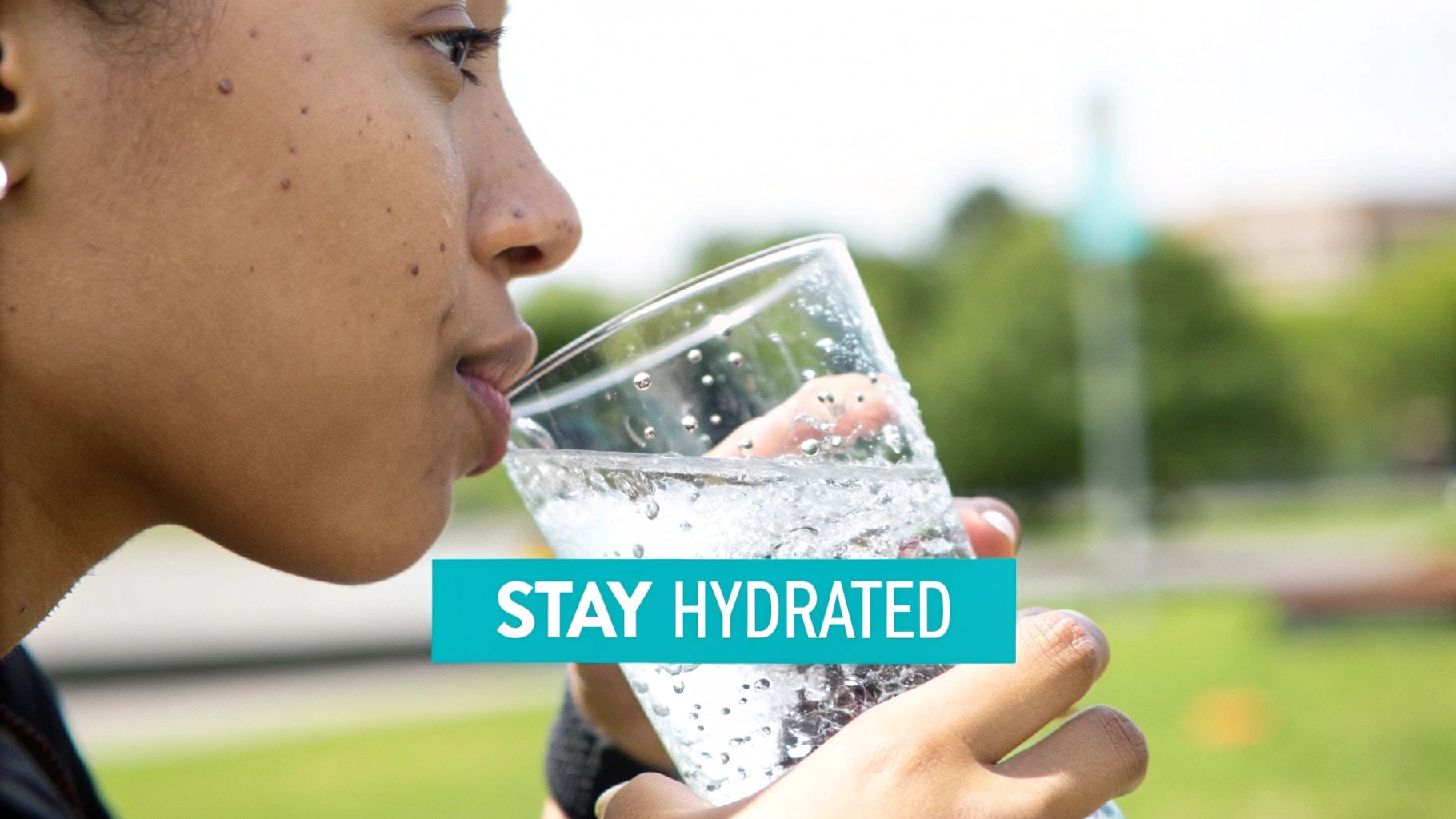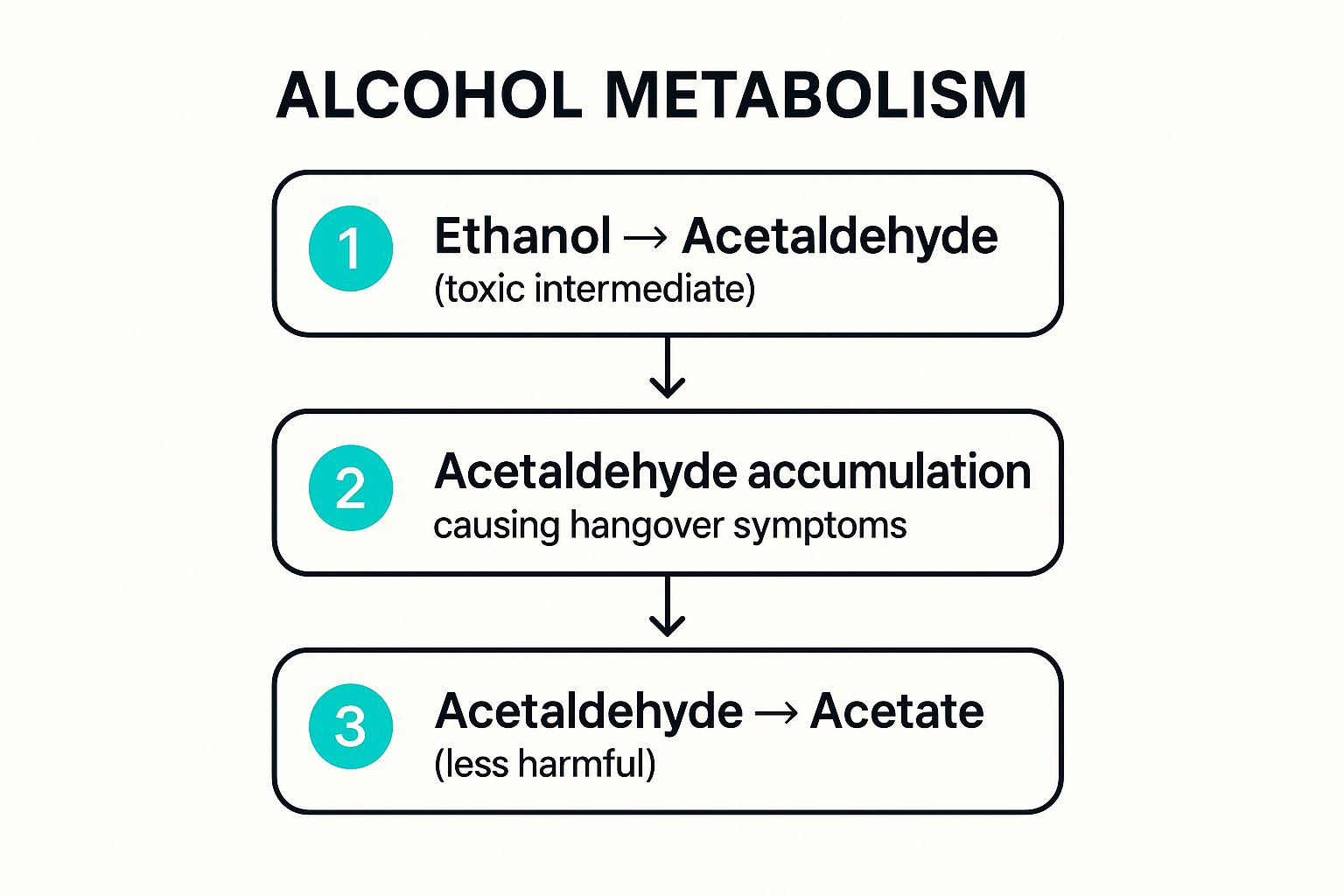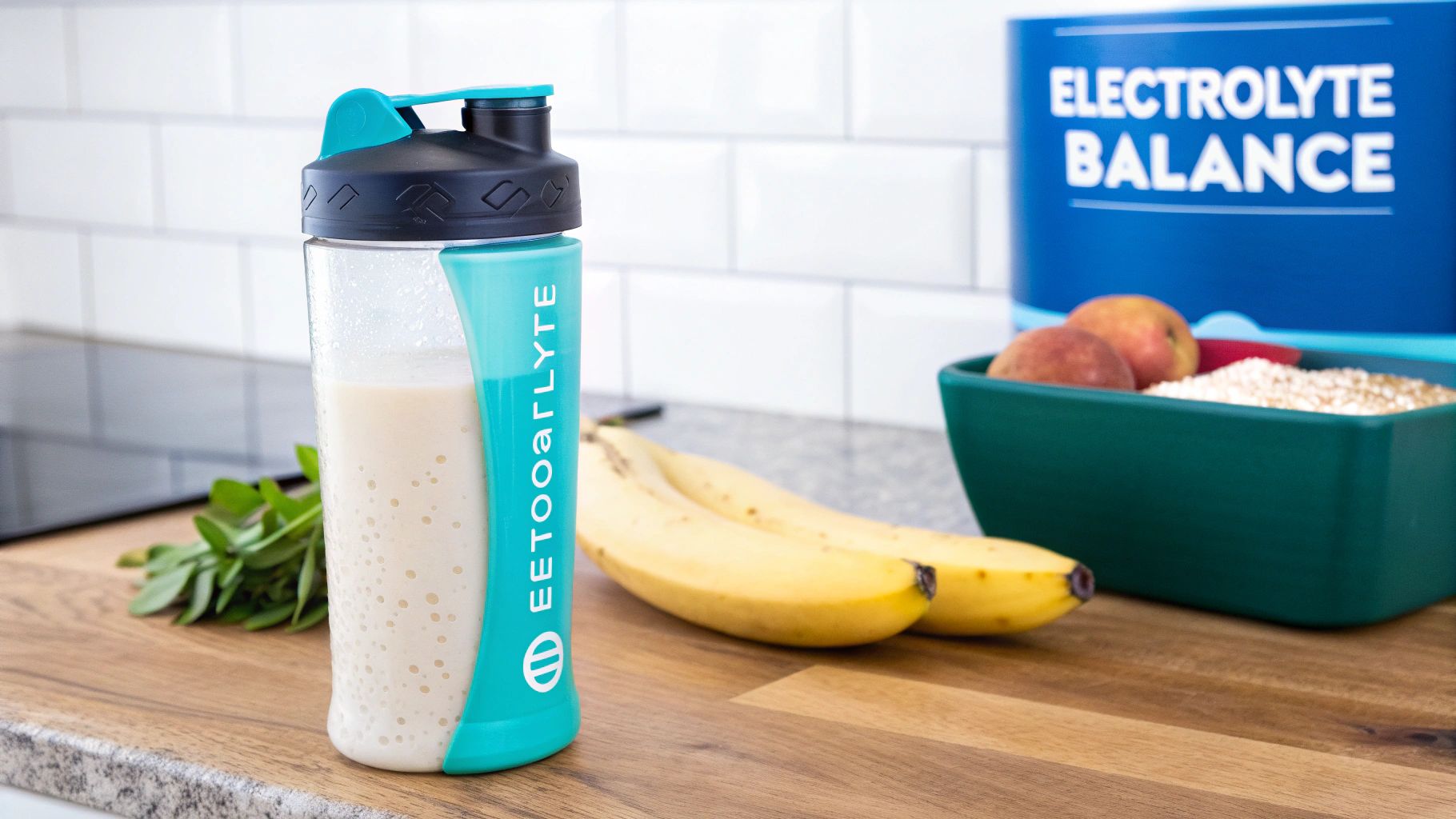

· By Annemarie
What Causes Hangovers? 7 Science-Backed Reasons
Decoding the Dreaded Hangover
What causes hangovers? This listicle explores seven key factors contributing to that post-drinking misery, empowering you to make informed choices and minimize those unpleasant after-effects. Understanding the science behind hangovers—from dehydration and inflammation to acetaldehyde toxicity and sleep disruption—is crucial for effective prevention and management. We cut through the noise and get straight to the facts, unlike other sites that may offer generic advice. This list provides actionable insights, so you can enjoy social occasions without sacrificing the next day.
1. Dehydration: A Major Culprit in Hangovers
When exploring what causes hangovers, dehydration quickly emerges as a primary suspect. Alcohol's diuretic nature forces your kidneys to produce more urine than usual, leading to significant fluid loss. This dehydration triggers many common hangover symptoms, including that pounding headache, persistent thirst, dizziness, and dry mouth. The process works like this: as your body expels more water than it absorbs, blood volume decreases. This causes the brain to shrink slightly, pulling on the sensitive membranes connecting it to the skull, resulting in pain. Furthermore, dehydration disrupts the delicate balance of electrolytes like sodium and potassium, essential for proper bodily function, further exacerbating hangover misery. Alcohol consumption can result in approximately four times more fluid loss than the volume consumed, highlighting the severity of this dehydrating effect.

While many factors contribute to a hangover, dehydration stands out as one of the most easily addressed and quickly reversible. However, its pervasiveness makes it often overlooked during a night out, and its effects compound with other hangover-inducing mechanisms. Recognizing the signs of dehydration, like extreme thirst the morning after, dark yellow urine following alcohol consumption, and dry mouth and lips after drinking, is crucial for effective management.
Why Dehydration Deserves Its Place on the List:
Dehydration's significant contribution to hangover symptoms and its relatively easy remediation make it a critical consideration for anyone looking to understand and mitigate hangover woes. While other factors like congeners and sleep disruption play a role, addressing dehydration offers a readily accessible starting point for feeling better faster.
Features and Benefits of Addressing Dehydration:
- Reduces Urination: Hydration helps restore fluid balance, counteracting alcohol's diuretic effects.
- Improves Water Reabsorption: Proper hydration supports the kidneys' ability to reabsorb water efficiently.
- Replenishes Electrolytes: Consuming electrolyte-enhanced drinks helps restore vital minerals lost during alcohol consumption.
Pros and Cons of Focusing on Hydration:
Pros:
- Easy to implement through simple hydration strategies.
- One of the more quickly reversible hangover factors.
Cons:
- Can lead to serious complications if severe dehydration occurs.
- Often overlooked during drinking episodes.
- Its effects are exacerbated by other hangover mechanisms.
Actionable Tips for Staying Hydrated:
- Pace Yourself with Water: Drink a glass of water between each alcoholic beverage. This helps maintain hydration throughout the night.
- Pre-Sleep Hydration: Consume a large glass of water before going to bed after drinking. This combats dehydration while you sleep.
- Electrolyte Boost: Consider electrolyte-enhanced drinks for rehydration, especially after heavy drinking. These drinks help replenish lost minerals.
- Monitor Urine Color: Aim for clear or light yellow urine as a sign of proper hydration.
By understanding the role of dehydration in hangovers and implementing these practical tips, you can take proactive steps to minimize discomfort and enjoy a more pleasant morning after. While some companies might offer quick-fix solutions, focusing on foundational hydration strategies is often the most effective approach. Prioritizing hydration empowers you to manage your own well-being and avoid unnecessary reliance on potentially less effective remedies.
2. Inflammatory Response
Beyond simple dehydration, a significant contributor to what causes hangovers is your body's own inflammatory response to alcohol. Alcohol consumption triggers this response, leading to the release of cytokines, which are inflammatory messengers. Think of it like this: your immune system reacts to alcohol as if it's fighting off an infection or illness. This explains why many hangover symptoms—fatigue, memory disturbance, decreased appetite, and difficulty concentrating—mirror those of being sick. This inflammatory cascade affects multiple body systems, contributing significantly to the general malaise you experience during a hangover.
The features of this inflammatory response include increased cytokine production and a systemic inflammatory response that specifically affects brain function and cognition. This reaction is very similar to what scientists call the "sickness behavior response," explaining the overall feeling of illness associated with a hangover.
One benefit of understanding this mechanism is that it clarifies why hangovers feel similar to being sick. This understanding also provides a potential avenue for mitigation, as the inflammatory response can be partially managed with anti-inflammatory substances. However, there are downsides. The inflammatory response can persist even after rehydration, making it difficult to counteract once triggered. Furthermore, frequent drinking may lead to cumulative inflammatory effects, potentially impacting long-term health.
For example, general achiness after drinking, hangover headaches that don't respond to simply drinking water, and the dreaded "brain fog" and cognitive impairment the morning after can all be attributed to this inflammatory response.
So, what can you do? Incorporating anti-inflammatory foods like turmeric and ginger into your diet, either before or after drinking, can potentially help. Avoiding combining alcohol with other inflammatory triggers, such as a poor diet or lack of sleep, is also wise. Perhaps most importantly, give your body adequate time to recover between drinking episodes to minimize the cumulative effects of inflammation.
Learn more about Inflammatory Response
This inflammatory response deserves a prominent place on the list of hangover causes because it represents a crucial and often overlooked aspect of the hangover experience. While other companies or articles might focus solely on dehydration, understanding the inflammatory process provides a more comprehensive picture and empowers individuals to take more targeted approaches to hangover prevention and management. While some resources might offer general advice, focusing on this specific mechanism, like we do, provides more actionable and effective strategies for our audience of social drinkers, nightlife enthusiasts, health-conscious individuals, busy professionals, and frequent travelers.
3. Acetaldehyde Toxicity
One of the primary culprits behind the misery of a hangover is acetaldehyde toxicity. When you drink alcohol, your liver works hard to process it. This process involves several steps. First, the alcohol (ethanol) is converted into acetaldehyde, a highly toxic compound significantly more harmful than alcohol itself. Acetaldehyde wreaks havoc on your body by damaging tissues and directly contributing to many unpleasant hangover symptoms. Your body then attempts to neutralize this toxin by converting acetaldehyde into acetate, a much less harmful substance. Unfortunately, this detoxification process is slower than the initial conversion of alcohol to acetaldehyde, allowing the toxic acetaldehyde to accumulate and cause a cascade of negative effects. This build-up is a significant contributor to what causes hangovers.
The infographic below visualizes the key steps in alcohol metabolism, highlighting the role of acetaldehyde.

As shown in the infographic, the accumulation of acetaldehyde, represented by the expanding red area, occurs because the conversion to acetate is a slower process. This build-up is a key driver of hangover symptoms.
This process, from ethanol to acetaldehyde to acetate, is crucial in understanding why hangovers happen. The first step, the conversion of ethanol to acetaldehyde, happens relatively quickly. The second step, converting acetaldehyde to acetate, is slower. This difference in speed is what allows acetaldehyde, a highly toxic intermediate metabolite, to build up in your system. This build-up leads to the direct tissue damage and creation of reactive oxygen species (free radicals) that contribute to the unpleasant symptoms we experience as a hangover.
Examples of acetaldehyde's effects are readily apparent. Facial flushing, particularly noticeable in some individuals of Asian descent due to a common genetic variation affecting the ALDH2 enzyme (often referred to as the "Asian flush"), is a direct result of acetaldehyde buildup. Nausea and vomiting, often associated with hangovers, are also driven by this toxicity. Even headaches resistant to typical painkillers can be attributed to the damage caused by acetaldehyde.
While the rate at which our bodies process acetaldehyde is largely determined by genetics, understanding this mechanism helps explain individual differences in hangover severity and offers potential avenues for mitigation.
Pros:
- Understanding the role of acetaldehyde can empower individuals to make informed choices about alcohol consumption.
- Certain compounds can support acetaldehyde breakdown, offering potential relief.
Cons:
- The speed of acetaldehyde processing is largely genetic and difficult to alter significantly.
- Sustained toxic exposure can occur, and repeated exposure can cause long-term damage.
Tips for Minimizing the Effects of Acetaldehyde Toxicity:
- Pace Yourself: Allow sufficient time for metabolism (roughly one hour per standard drink). This allows your body to process the acetaldehyde more effectively, reducing the build-up.
- Support Liver Function: Hydration and nutritious foods can help support your liver's detoxification processes.
- Consider N-acetylcysteine (NAC): Under medical supervision, N-acetylcysteine can support glutathione production, an important antioxidant that helps combat the effects of acetaldehyde. Always consult with a healthcare professional before taking any new supplements.
The increased awareness of the “Asian flush” phenomenon has brought the issue of acetaldehyde toxicity into the spotlight, highlighting its significant contribution to what causes hangovers. By understanding the science behind this process, we can make more informed choices and take steps to minimize its negative impacts.
4. Congeners and Toxic Compounds
One of the significant culprits contributing to the misery of a hangover is the presence of congeners and other toxic compounds in alcoholic beverages. These substances are by-products of the fermentation and aging processes, and while they can contribute to the desirable flavors and aromas of certain drinks, they also play a role in hangover severity. Understanding their impact can help you make more informed choices about what you drink and potentially lessen the after-effects. This factor is crucial in understanding what causes hangovers and deserves a place on this list due to its often-overlooked impact.
Congeners are a diverse group of chemicals, including methanol, tannins, histamines, fusel oils, and various aldehydes. These compounds are produced alongside ethanol (the alcohol we consume for its intoxicating effects) during fermentation and are further concentrated during aging, especially in wooden barrels. The liver must process not only the ethanol but also these additional toxins, placing a greater burden on the organ and potentially prolonging recovery. Some congeners even have their own toxic metabolites, adding another layer of complexity to the detoxification process.
Darker alcoholic beverages like bourbon whiskey, brandy, and red wine typically contain significantly higher levels of congeners compared to clearer spirits like vodka or gin. This is due to the aging process and the use of ingredients that are naturally rich in these compounds. For example, bourbon whiskey, aged in charred oak barrels, can contain up to 37 times more congeners than vodka, which undergoes multiple distillations to remove impurities. Similarly, red wine, while boasting potential health benefits from antioxidants, also contains tannins and histamines that can trigger headaches in some individuals. Cheaper alcoholic beverages can also harbor higher levels of impurities and congeners due to less stringent production processes.
Features of Congeners:
- Higher concentration in dark-colored alcoholic beverages.
- Contribute to the beverage's flavor and aroma profile.
- Include methanol, histamines, tannins, and fusel oils.
- Often correlate with hangover intensity.
Pros of Understanding Congener Content:
- Can be partially avoided by choosing lower-congener beverages.
- Knowledge empowers more informed drinking choices.
Cons of Congeners:
- Often present in more flavorful, premium alcoholic beverages.
- Processing adds to the liver's burden beyond alcohol itself.
- Some congeners have their own toxic metabolites.
Actionable Tips for Minimizing Congener Intake:
- Choose lighter-colored spirits: Opt for vodka or gin instead of whiskey or brandy to significantly reduce congener intake.
- Look for quality: Premium brands typically employ better filtration methods, reducing impurities and potentially congeners, although this doesn't eliminate them entirely.
- Moderation is key: Regardless of the beverage, consuming less alcohol overall is the most effective way to minimize the negative effects, including those caused by congeners.
By understanding the role congeners play in what causes hangovers, you can make strategic choices about your alcohol consumption. While savoring a richly flavored dark spirit occasionally is perfectly acceptable, being mindful of congener content can help you enjoy your night out and wake up feeling refreshed.
5. Sleep Disruption
One of the most overlooked factors contributing to what causes hangovers is sleep disruption. While a nightcap might seem like a good way to unwind, alcohol significantly impacts your sleep quality, even if it initially makes you feel drowsy. Instead of promoting restful sleep, alcohol disrupts normal sleep architecture, leading to a cascade of hangover symptoms. It reduces REM sleep – the crucial stage for cognitive restoration and memory consolidation – by a staggering 40-60%. This disruption contributes significantly to the fatigue, irritability, and cognitive impairment commonly experienced during a hangover.

Furthermore, alcohol causes fragmented sleep patterns, essentially breaking your sleep into shorter, less restorative segments. As alcohol's sedative effects wear off during the night, it triggers rebound wakefulness, often resulting in early waking or middle-of-the-night insomnia. This sleep deprivation exacerbates hangover symptoms, compounding the effects of dehydration and the body's processing of alcohol's byproducts. The disruption of circadian rhythms can also contribute to the feeling of being "out of sync" the following day.
Examples of this alcohol-induced sleep disruption include waking up far earlier than usual after drinking despite feeling utterly exhausted, or feeling unrested and groggy even after logging what seems like a sufficient number of hours asleep. Difficulty concentrating and general cognitive sluggishness the day after drinking are also telltale signs. Understanding this mechanism helps explain why the fatigue associated with a hangover often extends beyond the direct effects of alcohol itself.
While some sources might discuss alternative remedies for hangovers, understanding the root causes, like sleep disruption, is crucial for effective mitigation. Learn more about Sleep Disruption. Focusing on improving your sleep hygiene, rather than relying on quick fixes, can make a significant difference.
Pros of understanding the role of sleep disruption:
- Explains fatigue beyond just alcohol's direct effects.
- Can be partially mitigated with proactive sleep hygiene.
Cons of alcohol-induced sleep disruption:
- Effects persist even after alcohol is metabolized.
- Compounds with other hangover symptoms.
- Can create a cycle of poor sleep with regular drinking.
Actionable tips to minimize sleep disruption caused by alcohol:
- Allow extra time for sleep: Plan for more sleep than usual after consuming alcohol.
- Avoid alcohol close to bedtime: Stop drinking at least 3-4 hours before going to bed.
- Optimize your sleep environment: Create a cool, dark, and quiet bedroom to promote restful sleep.
- Consider a short nap: A brief nap the following day can help alleviate some of the sleep deprivation effects, but avoid long naps that can disrupt your nighttime sleep.
The rise of sleep tracking apps has significantly increased public awareness of alcohol's detrimental impact on sleep quality. This awareness allows individuals to make informed decisions about their alcohol consumption and take steps to mitigate its negative consequences, including those dreaded hangovers.
6. Gastrointestinal Disturbances
Alcohol's impact on your digestive system is a major contributor to what causes hangovers. Alcohol directly irritates the stomach lining and increases acid production, leading to inflammation and a cascade of unpleasant symptoms like nausea, stomach pain, and vomiting. Beyond the stomach, alcohol also slows intestinal movement, which is responsible for the uncomfortable bloating and trapped gas some experience. Perhaps most significantly, it disrupts the gut's barrier function. This protective barrier usually prevents harmful bacterial toxins from entering the bloodstream, but alcohol weakens it, allowing these toxins to circulate and trigger systemic inflammatory responses that contribute to the overall misery of a hangover. This disruption of intestinal barrier integrity further fuels the digestive discomfort so characteristic of hangovers.
Specific features of alcohol-induced gastrointestinal distress include:
- Direct irritation of stomach lining: Leading to inflammation and pain.
- Increased stomach acid production: Causing heartburn and nausea.
- Delayed gastric emptying: Contributing to bloating and that "still full" feeling.
- Disruption of intestinal barrier integrity: Allowing toxins to enter the bloodstream and worsen inflammation.
The good news is that these gastrointestinal symptoms typically resolve within 24 hours without treatment, and you can take steps to mitigate them. Eating a substantial meal before drinking helps protect the stomach lining and slow alcohol absorption. Avoiding spicy or acidic foods while drinking can also prevent exacerbating irritation.
However, in severe cases, the nausea and vomiting can make it difficult to rehydrate orally or keep down medication. Moreover, alcohol can trigger or worsen pre-existing digestive conditions like irritable bowel syndrome (IBS) or acid reflux. Frequent, heavy drinking can even contribute to long-term gastrointestinal problems.
Common examples of alcohol-induced digestive issues during a hangover include morning-after nausea and vomiting, a general loss of appetite, and lingering stomach pain or heartburn. Research suggests that gut health plays a significant role in hangover severity. Exploring ways to support your gut health might offer some relief, such as with CBD oil and gut health according to SMOKO CBD.
Here are some practical tips to manage hangover-related gastrointestinal discomfort:
- Eat before you drink: A substantial meal containing healthy fats, protein, and complex carbohydrates helps create a buffer against alcohol's irritating effects.
- Avoid spicy or acidic foods: These can aggravate the stomach lining and worsen discomfort.
- Consider bismuth subsalicylate (Pepto-Bismol): This over-the-counter medication can help soothe stomach upset.
- Try ginger tea: Ginger has natural anti-nausea properties and can be a gentle way to settle your stomach.
Understanding the impact of alcohol on your gut is crucial for effectively managing and minimizing hangover symptoms. By taking proactive steps and being mindful of your digestive health, you can better equip yourself to navigate the aftermath of alcohol consumption.
7. Electrolyte Imbalance
One of the key contributors to that awful hangover feeling is an electrolyte imbalance. Alcohol acts as a diuretic, meaning it increases urine production. This excessive urination flushes out essential electrolytes like sodium, potassium, magnesium, and calcium. These electrolytes are vital for a wide range of bodily functions, including nerve and muscle function, hydration, and various cellular processes. Their depletion contributes to many common hangover symptoms, such as fatigue, weakness, muscle cramps, headaches, and difficulty concentrating. This imbalance disrupts everything from heart rhythm to brain function and can take time to fully restore.

The disruption of electrical signaling in nerves and muscles caused by this electrolyte imbalance is a major reason why what causes hangovers is such a complex issue. While dehydration plays a significant role, simply drinking water isn't enough to fully address the problem. Severe electrolyte imbalances can even lead to dangerous cardiac rhythm disturbances after heavy drinking. Therefore, understanding and addressing this imbalance is crucial for effective hangover recovery. Learn more about Electrolyte Imbalance
Examples of Electrolyte Imbalance During a Hangover:
- Muscle cramps and weakness: This is a direct result of low potassium and magnesium levels.
- Irregular heartbeat after heavy drinking: A severe consequence of electrolyte imbalance, particularly affecting potassium.
- Persistent headaches resistant to regular painkillers: Electrolyte imbalances can exacerbate headache pain.
Pros of Addressing Electrolyte Imbalance:
- Relatively easy to address with proper supplementation.
- Understanding this mechanism helps explain specific hangover symptoms.
Cons of Ignoring Electrolyte Imbalance:
- Not fully resolved by water alone.
- Can cause dangerous symptoms if severe.
- May require specific replacement strategies.
Tips for Managing Electrolyte Imbalance:
- Consume electrolyte-enhanced beverages before bed and upon waking: This proactive approach can help mitigate the effects of alcohol's diuretic action.
- Consider foods high in potassium like bananas or coconut water: These provide a natural source of electrolytes.
- Sports drinks can help but watch the sugar content: While effective, excess sugar can complicate things.
- Electrolyte tablets can be a convenient option: These offer a concentrated dose of essential electrolytes.
This electrolyte aspect of hangovers is a crucial part of understanding what causes hangovers and deserves its place on this list. While other remedies might address some symptoms, a comprehensive approach that includes restoring electrolyte balance is often more effective. Sports medicine research has long emphasized the importance of electrolytes for recovery after strenuous exercise, and the same principles apply to recovering from alcohol consumption. By understanding the role of electrolyte imbalance, and proactively addressing it, you can significantly improve your post-drinking experience.
7 Key Causes of Hangovers Compared
| Cause | Implementation Complexity 🔄 | Resource Requirements ⚡ | Expected Outcomes 📊 | Ideal Use Cases 💡 | Key Advantages ⭐ |
|---|---|---|---|---|---|
| Dehydration | Low – simple hydration steps | Low – water and electrolytes | Rapid symptom relief including reduced thirst, headache | General hangover with thirst and dry mouth | Quickly reversible, easy to address |
| Inflammatory Response | Moderate – needs anti-inflammatory agents | Moderate – anti-inflammatory foods/supplements | Reduces fatigue, cognitive impairment, malaise | Hangovers with systemic achiness and brain fog | Explains illness-like symptoms |
| Acetaldehyde Toxicity | High – metabolic process; genetic factor | Moderate – liver support, medical supplements | Mitigates tissue damage, nausea, flushing | Severe hangovers, sensitive individuals | Clarifies individual differences in severity |
| Congeners and Toxic Compounds | Moderate – requires beverage choice | Low to Moderate – choosing low-congener drinks | Less severe hangover intensity | Those aiming to reduce hangover severity via drink choice | Allows informed beverage selection |
| Sleep Disruption | Moderate – behavioral adjustments | Low – sleep hygiene improvements | Improves restfulness, reduces grogginess | Hangovers with fatigue and poor concentration | Partially mitigable, explains fatigue |
| Gastrointestinal Disturbances | Low to Moderate – dietary and medicinal | Moderate – pre-drinking meals, OTC remedies | Reduces nausea, stomach pain, vomiting | Hangovers with digestive discomfort | Symptoms typically self-limiting, preventable |
| Electrolyte Imbalance | Low – supplementation | Low to Moderate – electrolytes, dietary changes | Improves muscle function and cognitive symptoms | Hangovers with cramps, weakness, persistent headaches | Addresses specific mineral deficiencies |
Taming the Hangover Beast
Understanding what causes hangovers is the first step in conquering them. As we've explored, that pounding head and queasy stomach are the result of a complex interplay of factors, from dehydration and inflammation caused by acetaldehyde, to the impact of congeners and disrupted sleep. It’s not just one thing; it’s a perfect storm of physiological responses to alcohol. While other products may address isolated aspects of a hangover, true relief comes from tackling the root causes. This knowledge empowers you to take control and minimize the after-effects of alcohol. Mastering these concepts – from pre-drinking hydration and mindful alcohol choices (considering congeners and pacing yourself) to replenishing lost electrolytes – is crucial for minimizing discomfort and maximizing your well-being after a night out. This allows you to enjoy social occasions without sacrificing the next day.
Ready to take a proactive approach to hangovers? Upside Hangover Sticks, formulated with natural ingredients inspired by Korean traditional medicine, offer comprehensive support to address the multiple factors contributing to hangovers. Learn more and discover how Upside Hangover Sticks can help you bounce back faster at Upside Hangover Sticks.
